How to talk to a parent whose child has a disability, without offending them
I recently did a quick survey through my Instagram stories, super scientific, I know. In my stories I asked parents who had children who used feeding tubes to share with me what they hated people to say when asking about their child’s feeding tube, and what they would prefer people to say to them instead. I received so many messages from my followers weighing in on the subject.
Although most of the responses were similar to how I would prefer people to interact with me about my own daughter’s feeding tube, some of the messages surprised me.
The scenarios:
- Let’s say you’re at the park with your kids, and you notice a child on the playground who is playing with one of your children happens to be wearing a backpack. That backpack appears to have a tube that attaches to the child under their shirt. You’re curious, and you want to ask the parent about the tube. But how do you start the conversation without your questions coming across offensive?
- Or, you’re sitting at the food court and the family beside yours is holding up a giant syringe with what appears to be milk inside. It has a long tube taped to the child’s face, going into the child’s nose. The parent just caught you staring at them. What do you do, what do you say? (Spoiler, smile and own up – the parent will appreciate that)
- Or, maybe you’re at playgroup and the parent sitting beside you in circle time is attaching a tube to their child’s stomach. They then start up a machine which has a bag of milk attached to it. How do you ask them what it is and why their children needs it without saying the wrong thing?
How do you talk to a parent about their child’s disability?
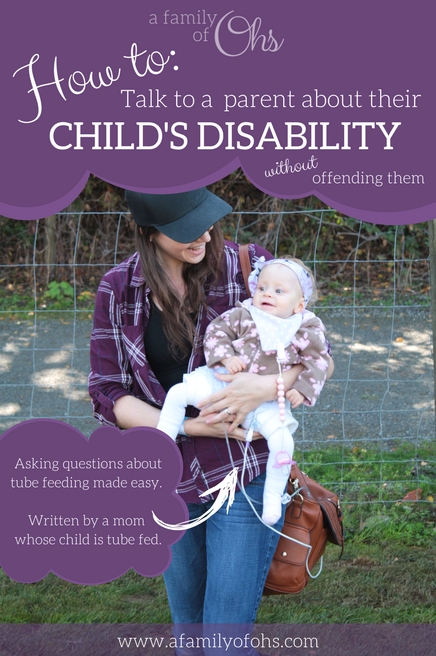
Disclaimer
This really does go without saying, this isn’t going to be applicable to all people, or all situations. Although all the people that weighed in on my unscientific poll seemed to be in agreement, but those people may not be the ones you are meeting in your town. Please take everything I say with a grain of salt. Know that I am a mother of a child who has a feeding tube, and this is how I feel it would be appropriate to ask me about my daughters feeding tube.
Quickly, what are feeding tubes? A feeding tube, which can enter the nose, mouth, or abdomen, is a tubing that provides liquid nutrition, hydration and medication to those who can not get it orally. Read more: www.feedingtubeawareness.org
Things to avoid
Let’s start with the things to avoid saying. Starting interactions with a blunt “what” question certainly gives off a negative feel for the parents receiving the question. It’s as if they are being quizzed on their child’s condition instead of questions with genuine care and interest. So avoid:
- “What is that?”
- “What are you doing?”
- “What’s wrong with your child?” (number 1 question not to ask)
Although your intrigue and care may be genuine, these questions may be perceived as insensitive and rude. Asking about a child’s disability needs sensitivity and care.
Step #1 Approaching the subject with a compliment:
Parents appreciate when you notice, and comment on, their child before bringing up the feeding tube. Most parents want to educate the general public about feeding tubes, and so in most cases, the won’t mind answering your questions.
A child with a disability is more than just their disability, so before you ask a parent about their child’s feeding tube, acknowledge the child first (be genuine and sincere):
- “Our kids are playing really well together, your child seems like such a sweet boy/girl”
- “Your daughter has such beautiful curls, I love the bow in her hair”
- “Wow, your child really knows their colours – I’m impressed”
Step #2 Asking to ask questions:
Before you ask the questions that you’re curious about, you must first ask permission to ask those questions. This allows the parent to answer yes or no and indulge in the conversation only if they want to:
- “Would you mind if I ask about that tube there?”
- “I’m sorry for staring but I’m just a little curious, would it be okay if I ask about what you are doing?”
- “Do you mind if I ask you what you’re doing, I’ve never seen that before?”
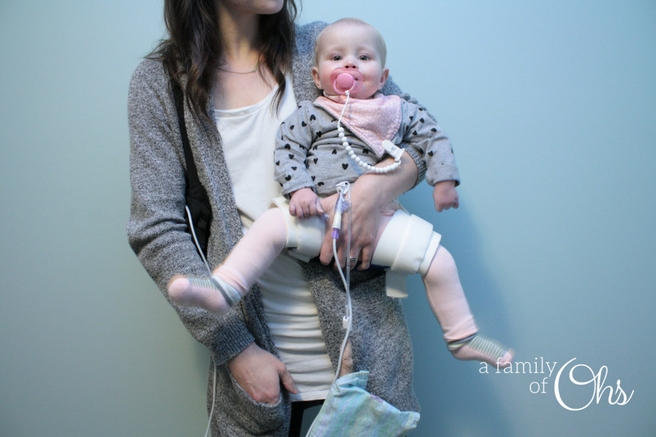
Step #3 Read the parent’s signs
Once you’ve asked your first question, allow the parent to continue the conversation on their terms. If they are short with their answers, and don’t elaborate on their child or why they have a feeding tube, that’s where I would stop asking questions. Just drop the conversation and choose to talk about something else. They are simply feeding their child, and maybe they don’t want to share any more details.
Most parents I’ve talked to are very happy to talk about their child’s feeding tube, and prefer when someone acknowledges the feeding tube instead of acting like you don’t see it. So don’t be afraid to try to start the conversation – gently.
Step #4 Continuing the conversation
If the parent seems to engage, and is excited to talk about their child and their journey with tube feeding, then go ahead and continue the conversation. Keep your questions light until you’ve established a deeper relationship with that person and continue to ask permission where appropriate:
- So at the park feel free to ask, “Do you mind if I ask why your child needs a feeding tube?”
- At the food court, “Wow, that’s incredible! Is she able to get all her food and water through the tube?”
- At playgroup, “Would you be able to tell me how it works? Did they have to have a surgery to put it in?”
Conversations parents usually don’t like:
- “How long will your child need a feeding tube?” – They probably don’t know, and your guess is as good as theirs.
- “Have you tried…” or “You should try…”- Remember, this parent has a team of medical professionals working with them and their child, and frankly, they probably don’t want unsolicited advice from a stranger. Try a gentler approach, “What kinds of things can you try to help your child?” or “How do you go about teaching, or encouraging them to feed orally?”
- “I feel so bad for you.” Pity comments do nothing positive. I can almost guarantee that the parent wants none of your pity.
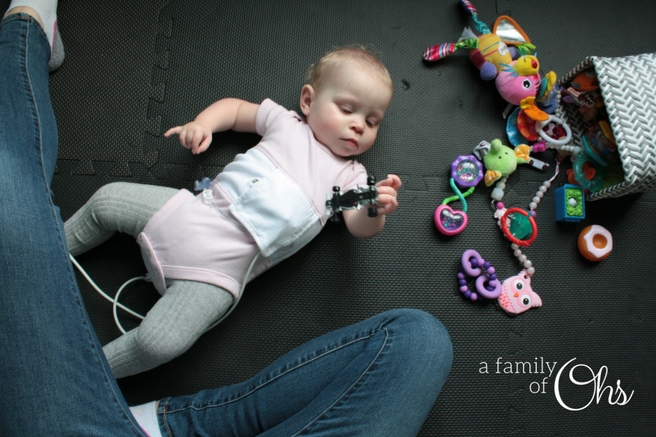
Step #5 Encourage them
At some point in the conversation, share some encouragement with the parent. Remember to do it without pity. Tube feeding is a lot of work, and so is parenting, and they already know that. But having someone give you a thumbs up for your efforts can really boost anyone’s mood. So remind them they are doing a good job:
- “You’re child looks really healthy, obviously you’ve been working really hard, and it totally shows. Keep up the good work!”
- “Fed is best, and you’re clearly doing a great job!”
- “You are such a hard worker, you can clearly see your dedication to your child. You’re doing an amazing job at being their parent!”
Step #6 Say “Thank you”
At the end of the conversation remember to say “thank you”. However much personal information that parent may have shared with you, you need to say thank you. For whatever reason their child requires a feeding tube, that is their personal information, and you need to show your appreciation to them for sharing that with you:
- “Thank you so much for sharing that with me, I had no idea how feeding tubes worked.”
- “Hey, thanks for letting me ask you those questions, I really appreciate you taking your time. I feel like I know so much more now.”
- “Thanks for sharing that with me, I do appreciate it.”
In a perfect world, no one would be offended, and everyone would know the right things to say. Unfortunately we don’t live in that world. But kindness, compassion, and a thank you will take you the extra mile. I hope the next time you come across someone whose child has a feeding tube (or any special medical equipment or disability for that matter) that these steps will help break the ice and make you feel more comfortable talking to someone who is a little different.
Remember, those who are different always have something to teach.
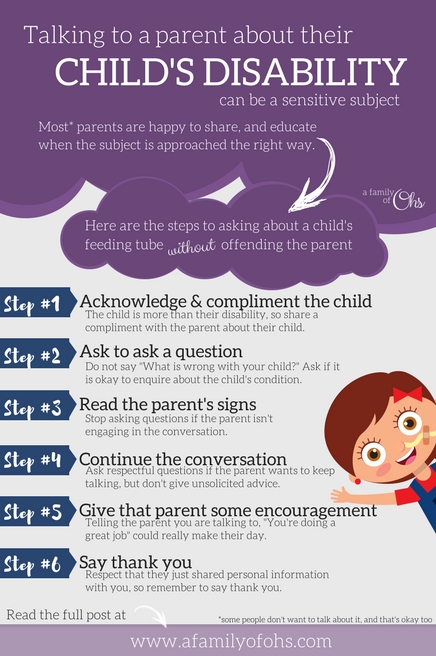
A summary
- Acknowledge, and compliment the child
- Ask to ask a question
- Read the parent’s signals
- Continue the conversation
- Give that parent some encouragement
- Say thank you

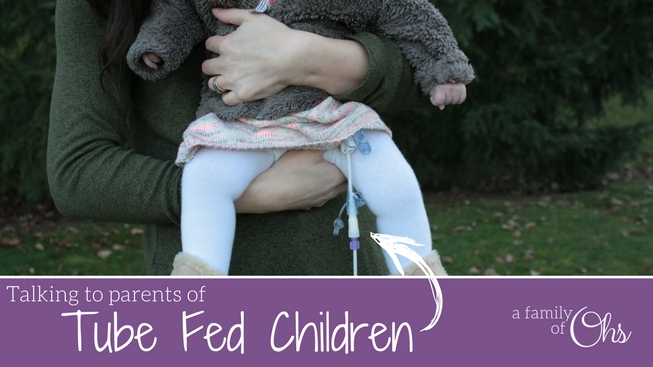
These are fantastic. That’s always our #1 question too- “How long will she need the tube?” It gets old. I usually just say, “We just take it day by day” with a smile. Recently we were at Target and my daughter was walking in front of me with her feed attached and me carrying the backpack. Someone walking by said, “Oh, you must be glad you have that!” I was surprised, and I said, “We’re not glad she has a feeding tube.” (That’s the first thing that popped into my head.) They walked away looking guilty but as we were checking out, they stopped us and apologized. I realized (and they confirmed) that they’d thought it was a toddler leash backpack. They were just commenting on having a little one walking around with us. They were so apologetic and I hope I graciously assured them that there were no hard feelings! I like when people ask kind questions so I can educate. back
Taking it day by day is so important, we never know what the future holds.
I think as parents we hold that responsibility to help educate those on how our life is different, but I can totally relate to be taken back by a comment and not really feel like you have a lot of time to think how you want to answer. I’m so glad you were able to reconnect with that stranger, I’m sure they were too!